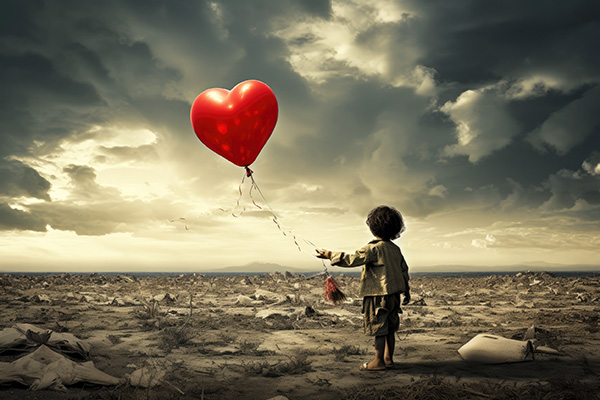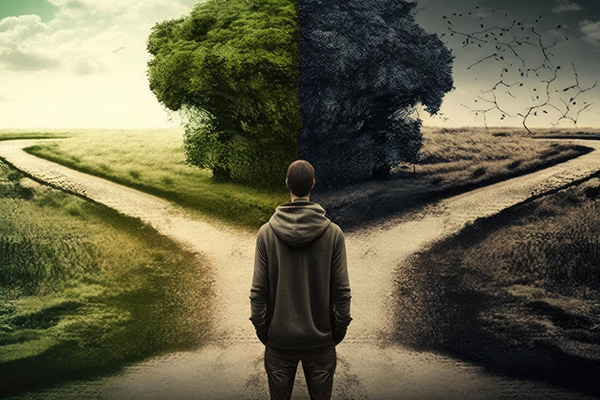Karma
Be The Light That Darkness Cannot Touch
 The nightmare continues every day. The very thing we fear the most has come to look us right in the face, staring in our eyes. This little imp taps us on the shoulder, reminding us of all the stupid things we did, all the hurtful things, how we messed up, time after time.
The nightmare continues every day. The very thing we fear the most has come to look us right in the face, staring in our eyes. This little imp taps us on the shoulder, reminding us of all the stupid things we did, all the hurtful things, how we messed up, time after time.
We messed up time again, no one agrees with us, we are reminded that “they” are so much smarter, did things exactly right every time.
We are at a turning point. We can give up, turn, run for the hills to hide, but still there is the demon of fear lingering around the deep recesses of our mind.
Surely this little devil of fear tells us we can see how we don’t deserve to reach our dreams, or accomplish our goals.
Stand back! Truly look at everything from all sides. Become like an eagle, or an owl, or a hawk, with eyes that see far beyond the surface where the heart lies.
Try to be kind and loving. Put your mind in the thoughts of being kind, being positive, no matter how much doing so lays open our heart for others to stomp on, even though many others will think you have lost your mind.
When we try with all our hearts to do something toward our dream, with love, with pure knowledge, we are listening to spirit. Then we gain strength, we gain courage, we pass over the top of the highest mountain to reach the other side. Let this outlook enlighten your heart, mind and soul toward a new attitude, for a new beginning.
Why Our Souls Cannot Afford A Lack Of Empathy
 Life has a way of weaving unexpected lessons into even the most ordinary or practical situations. Sometimes what begins as a business transaction or a casual encounter becomes a doorway into something far more meaningful, a reminder of the deep human connection we are all longing for and the healing power of simple empathy.
Life has a way of weaving unexpected lessons into even the most ordinary or practical situations. Sometimes what begins as a business transaction or a casual encounter becomes a doorway into something far more meaningful, a reminder of the deep human connection we are all longing for and the healing power of simple empathy.
I recently found myself in a situation that reminded me of this truth in the most unexpected way.
I am in the process of selling two homes in different states, which has been quite challenging. Anyone who has sold property knows how stressful and complicated it can be…much less two properties at the same time!
Over the past couple of months I had spoken to quite a few realtors and interested buyers. One agent initially showed strong interest in one of my homes. He seemed genuinely eager, but then he suddenly disappeared without explanation. My calls and messages went unanswered. While I did not sense that he had completely lost interest, I could not wait indefinitely and had to continue moving forward with my plans.
Still, I could not shake a quiet concern for him, as though something more was happening behind the scenes, and the feeling carried a weight of unease.
Several months later, he reached out unexpectedly, asking if I had sold my property yet. He apologized for vanishing and then explained the reason for his absence. He had been in a serious car accident and had spent time in the hospital. His injuries required surgery, and bolts had been placed in his foot. Now he was in physical therapy, learning to walk again.
Your Spirit Guides Will Never Lead You Astray
 “My guides must hate me! Why else would they lead me to things that cause me so much pain?” someone once said during a reading. “And where is my guardian angel when I need him?”
“My guides must hate me! Why else would they lead me to things that cause me so much pain?” someone once said during a reading. “And where is my guardian angel when I need him?”
It was not the first time I’ve heard such sentiments from a distressed client. This kind of disappointment and frustration is not uncommon because it cuts to the heart of spiritual seeking.
It is certainly a valid concern. If angels, guides, and ancestors are meant to guide, support, and protect us, then why do they sometimes lead us to pain, heartache, and even trauma? Do they really have our backs, or are they inflicting suffering upon us for some strange reason?
I confess that there was a time in my own life when I also asked these kinds of questions.
But after years of working as a professional psychic and energy healer, as well as through my own spiritual growth journey, I’ve since come to a comforting conclusion. Our spirit helpers always operate from a place of divine wisdom, unconditional love and compassionate support.
Then why, you may ask, do bad things sometimes happen to good people? It’s simple, really. Any detour from our highest good does not occur because spirit somehow miscalculated, neglected, or misrepresented anything.
When we encounter trouble, it is usually our own doing, or something we co-created with others. Whatever the reason or cause, we alone are always the common denominator.
Below are a few examples of such self-inflicted calamities that I have repeatedly come across in my work, as well as how they differ from actual spirit guidance and divine intervention.
Everything You Need To Know About Soulmate Connections
 Who is my soulmate?” It’s a question I often hear during psychic readings. Clients want to know if their current partner is “the one,” or when their soulmate will arrive.
Who is my soulmate?” It’s a question I often hear during psychic readings. Clients want to know if their current partner is “the one,” or when their soulmate will arrive.
Some people start relationships convinced they’ve met their soulmate, only to watch their supposed “forever love” walk away with someone else. Puzzled, they contact me, asking, “How could this happen if two souls were meant to be together?”
Too many people are left heartbroken and confused when a well-meaning relative or friend, or a misguided psychic lacking spiritual integrity, encourages or assures them that this person is definitely “the one.”
Wrongly believing that a love connection is fated can make the subsequent loss even more painful. Just because a connection feels intense or special doesn’t mean it’s destined to last forever. True soul connections serve a purpose, but that purpose isn’t always love, romance, or lifelong companionship.
Unscrupulous readers and people with poor judgment often misread situations and create false hope, causing lovestruck individuals to cling to relationships that were never meant to last—or even exist, for that matter.
So, what exactly is a soulmate? Spiritually speaking, a soulmate is someone with whom you share a profound pre-birth or past-life connection, or both. These people show up in our lives to help us evolve spiritually, often reestablishing old relationships for the purpose of healing and transformation.
When Walking Away Is A Sacred Act of Love
 One of the most life-changing truths we come to face on the spiritual path is this: not everyone is meant to walk with us all the way.
One of the most life-changing truths we come to face on the spiritual path is this: not everyone is meant to walk with us all the way.
As we awaken and align more closely with our authentic self, some relationships begin to fall away. While it’s natural to resist this because endings hurt and change can feel like loss, there is a quiet, sacred truth beneath it all: Letting go is often an act of love.
As your soul expands, you begin to see your relationships differently. They are no longer just emotional bonds or physical connections; they reveal themselves as soul contracts—agreements made on a spiritual level before you ever met people in the physical realm.
Some people come into your life to uplift you, to love you, and to walk beside you for the long haul. Others arrive to teach you about boundaries, self-worth, and discernment. Once their role is complete, the relationship may start to feel heavy, strained, or even harmful. This isn’t failure; it’s a sign that the contract has been fulfilled.
Yet, this part of the journey is rarely discussed. In spiritual circles, we often hear messages about unconditional love, compassion, forgiveness, and acceptance. These are indeed sacred spiritual principles. But we rarely hear the equally sacred teaching that sometimes the most loving thing you can do is walk away!
Letting go of a toxic or misaligned relationship is not abandonment or selfishness. It’s not also not a sign of weakness, cowardice, or a lack of spiritual depth. In fact, it often requires more courage and clarity than staying.
We Can’t Always Rescue The Ones We Love
 A topic that often comes up in psychic readings is the client’s concern for someone they love – a child, significant other, sibling, close friend, or even a co-worker.
A topic that often comes up in psychic readings is the client’s concern for someone they love – a child, significant other, sibling, close friend, or even a co-worker.
The problem? Usually the person has chosen a path that is confusing, destructive, or even life-threatening: substance abuse, toxic relationships, unwise career moves, or a lifestyle that just doesn’t make sense to the onlooker.
If you’re nodding your head right now about someone in your own family or circle of friends, you’re not alone. We’ve all been there – watching someone we love make free will choices that, from our perspective, can only lead to pain, loss, or utter disaster.
Maybe they have moved in with someone who is controlling and abusive, or they dropped out of college to move across the country and get married to someone they hardly know. Or maybe they are determined to put their life savings into a shady Ponzi scheme. Maybe they keep repeating choices and patterns that seem so clearly wrong for them.
Maybe you’ve seen the red flags from day one, and your heart is already aching with a kind of spiritual déjà vu…because you know what’s coming. And yet…you feel powerless to stop it.
This is where spiritual teachings can offer both comfort and perspective. According to many wisdom traditions, it’s often the most painful, confusing, or seemingly misguided paths that lead to the greatest soul growth. Sometimes a person must walk through fire or descend into darkness to find their light. And as difficult as that is to witness, it may very well be part of their soul plan.
The Divine Path Back To Unconditional Love
 Recently, I was meditating on a deeply personal situation — one that stirred up waves of anger and resentment, even bordering on hatred and bitterness. Then I received an insight from spirit that stopped me in my tracks. It was one of those profound moments when time stands still and sacred truth illuminates your heart.
Recently, I was meditating on a deeply personal situation — one that stirred up waves of anger and resentment, even bordering on hatred and bitterness. Then I received an insight from spirit that stopped me in my tracks. It was one of those profound moments when time stands still and sacred truth illuminates your heart.
“Never forget the Golden Rule,” spirit said. “Do unto others as you would have them do unto you. Do not do to others what you do not want done to you. Do unto others as you would have them do unto you.”
Suddenly I realized that the deeper truth of holding unconditional love in your heart. It’s a universal spiritual principle because it works both ways! You would never, ever want the same hatred or anger that you direct at others, to be directed at you.
Now let me be honest. My anger this time wasn’t just outward to others. It also turned inward. It was a growing dark, toxic presence in my heart and mind.
Life has been hard lately. Too many people I know have died far too young. Watching my beloved partner in a so-called “medical facility” that should not be allowed to take care of anyone, especially our elders. Almost losing him. Being emotionally and financially drained by someone I trusted. The exhausting noise of political chaos.
It has been one thing after another, piling up until I reached a boiling point. I began to ask the big, painful question: Why? Why all this suffering? Why now? Why me? And I wasn’t just angry at the world — I was angry at myself. Angry at Source, Spirit, God. Angry at the seeming cruelty of it all.